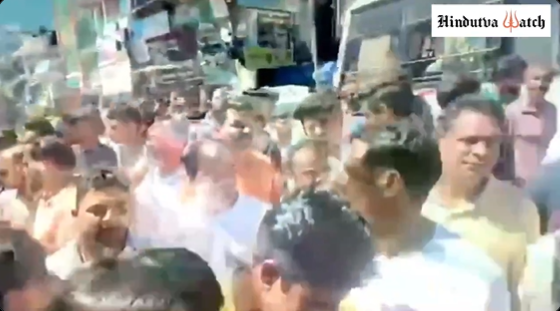Himachal Pradesh, a state known for its serene landscapes, is now engulfed in communal tension as right-wing extremists unleash violence on poor Muslim households and properties. Muslim homes, businesses, and places of worship have been targeted in coordinated attacks across towns such as Shimla, Mandi, Solan, and Hamirpur. Under the guise of protesting ‘illegal’ mosques and ‘outsiders,’ these mobs are wreaking havoc on the most vulnerable members of the Muslim community, leaving behind a trail of destruction and fear, reported The Tribune.
The Congress-led government, headed by Chief Minister Sukhvinder Singh Sukhu, is grappling with the situation, struggling to curb the wave of violence. Despite his firm stand against mob justice, insisting that legal disputes should be resolved in the courts, the administration has been criticized for its inability to protect Muslim citizens. The violence reflects a broader pattern of communal politics, with extremists capitalizing on religious tensions to destabilize the state.
Observers believe that the sudden surge of anti-Muslim protests is not a random occurrence but part of a calculated effort by the BJP to undermine the Congress government. Following its defeat in the 2022 elections, the BJP has been on a campaign to weaken the Sukhu administration through political maneuvering, including encouraging factionalism, blocking state revenues, and now fueling communal strife.
The demands of the protesters – to demolish so-called illegal mosques and scrutinize ‘outsiders’ – are widely seen as a pretext for targeting Muslims. The singling out of mosques amid numerous other unauthorized structures, including temples and gurudwaras, reveals the discriminatory nature of the protests. Reports indicate that over 15,000 irregular buildings exist in Shimla alone, yet only Muslim structures are facing scrutiny. The exact legal status of many of these mosques is complex, with cases pending in court, and in some instances, mosque authorities have already begun addressing alleged violations. However, extremists appear intent on inflaming tensions rather than seeking resolution.
Adding to the crisis is the push to identify and restrict Muslim migrants, a move reminiscent of exclusionary practices in BJP-ruled states. Such demands threaten the constitutional rights of all citizens to live and work freely within India. The impracticality of verifying every person entering a tourism-dependent state like Himachal Pradesh underscores the absurdity of this agenda, which seems designed to intimidate and exclude Muslims rather than address legitimate concerns.
Economic motivations also drive this unrest, as trade groups and business associations lead the charge against small Muslim vendors and traders. These groups appear eager to eliminate competition from Muslim-run businesses, leveraging communal tensions to secure economic advantage while further marginalizing the poor.
The near silence from other segments of society – including political parties, civic groups, and the media – has only emboldened these extremist elements. While the chief minister’s resistance to vigilante actions is a positive step, the broader lack of solidarity highlights a troubling erosion of secular values. Notably, some progressive organizations, such as CITU, Himachal Kisan Sabha, DYFI, and others, have announced a public peace and unity rally to counter the narrative of hate and push for communal harmony.
This unfolding crisis in Himachal Pradesh is not just a regional issue; it reflects a dangerous trend of exploiting religious differences for political and economic gain. At stake is not only the stability of a state but the preservation of India’s core values of diversity, inclusivity, and justice. As violence against poor Muslim communities continues, the need for a united response to uphold the principles of secularism and protect all citizens grows more urgent.
The battle in Himachal Pradesh extends beyond political maneuvering; it is a fight for the soul of a multicultural society. The government, civil society, and common citizens must stand together against the forces of hatred and division, defending the rights of all, particularly the most vulnerable, to live with dignity and peace.




